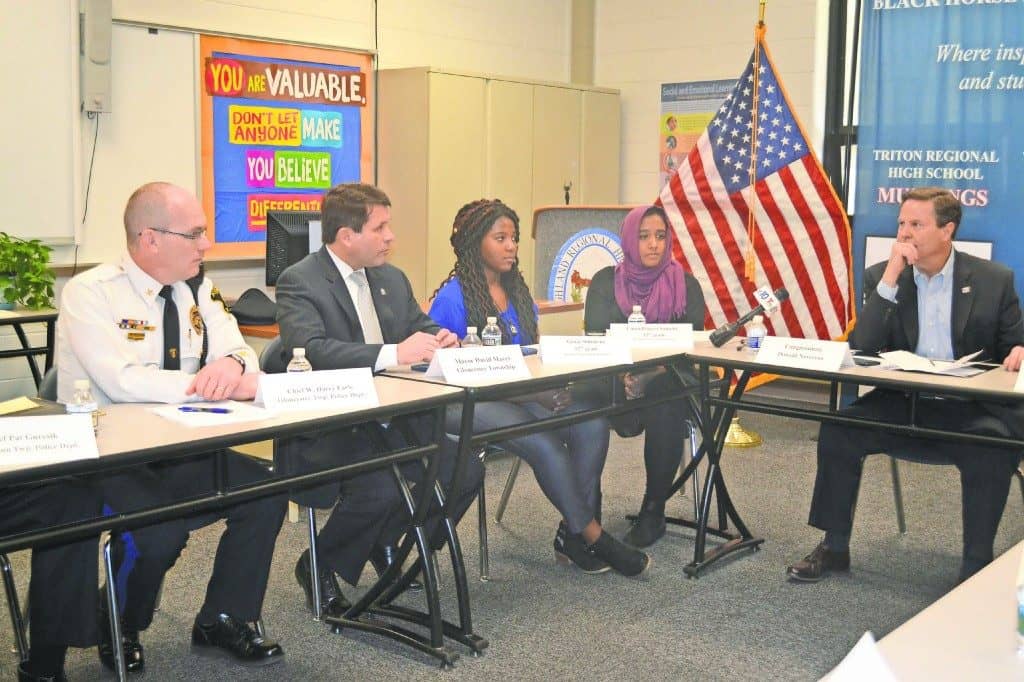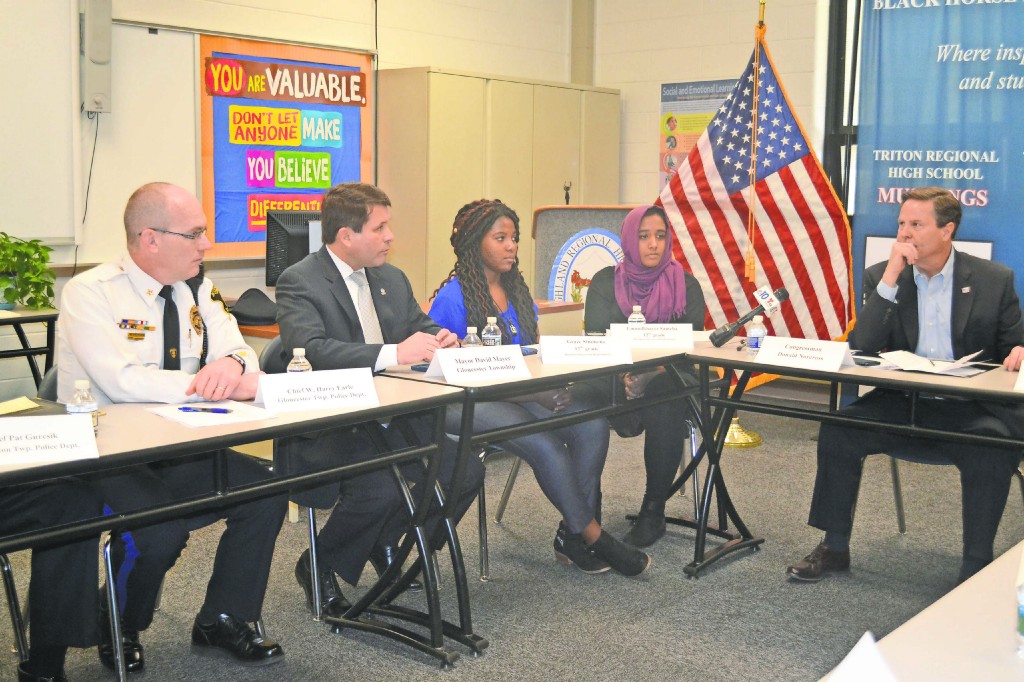
Norcross led a discussion with Gloucester and Washingtown Township students, police officers, politicians and school administrators.

On Wednesday afternoon, police, students, educators and politicians, including Mayor David Mayer and Congressman Donald Norcross, conducted a roundtable discussion about the local, state and federal approaches to school security.
In light of the Feb. 14 mass shooting in Parkland, Fla., the panel, which included the chiefs of police and superintendents of both Gloucester and Washington townships, spent an hour not only recognizing the spectrum of issues encompassed in this national crisis but also brainstorming solutions.
“Somehow, given what our country is going through and the amount of times we’ve been through this — this seems different,” Norcross said. “But, it should not be different.”
Recently, Norcross met survivors of the Parkland shooting who were in Washington, D.C., advocating for gun reform where he found himself particularly moved by the swelling necessity for gun control.
From lawful to medical, the group broke down various cures to this epidemic plaguing the country.
In kicking off the conversation, Norcross discussed elements of the Second Amendment, stressing the Constitution’s language was intended for 18th-century muskets and not the malicious weapons of today.
“Banning the weapons of war — these high-velocity bullets that are just shredding humans, which are designed to kill,” Norcross said.
As the discussion proceeded, a recurring topic was, amid heightened police presence, how a school can still feel like a sanctuary of learning. With nationwide debates about arming teachers, the welcoming nature of schools can be comprised.
“There’s a real delicate balance between creating a loving, emotionally charged, happy environment for our children where they get to love and grow,” said Joe Bollendorf, superintendent of the Washing Township Public Schools. “We’re building prisons in order to keep them safe. … I’m not about building prisons to teach our kids. I think that school needs to be a place where we celebrate happiness.”
Another point of contention lies in the costs of these safety methods. In configuring district budgets, the alterations to schools’ security systems could potentially have an impact on other areas, such as adding new teacher salaries.
Brian Repici, superintendent of the Black Horse Regional School District, brought up a grant given to school resource officers after the 1999 Columbine shooting, which he says dried up within two years.
“I’d like to see additional funding from the Department of Justice for grants, like the one they had in 1999, to fund additional resource officers,” said Patrick Gurcsik, Washingtown Township chief of police. “Other than the mental health issues that need to be addressed … I think more police officers in schools, that will definitely help the situation.”
Mental health was another pertinent point of discussion, as panels not only hit on the need for more counseling but also the omission of psychological evaluations in local gun purchases.
Chief W. Harry Earle said in Gloucester Township, the background check to acquire a handgun and a long gun are nearly identical, as investigations only differ depending upon ages.
“During that process, we will encounter some area where we see a mental health concern,” Earle said.
According to Earle, as long as a gun buyer presents a note from a medical doctor deeming a person mentally and physically capable of using a gun, they are able to obtain a weapon. He says the note would trump a patient’s history of being admitted into a mental facility or receiving treatment from a physiatrist.
“At times, we look at it, as a police department, and we think, ‘Do we really think this person should be carrying a weapon?’” Earle said. “But yet, there is virtually no choice.”
Along the lines of mental health, Bollendorf brought up the philosophy that the increase in school shootings since Columbine could potentially stem from the incessant need for students and teachers to academically perform at a superior standard.
“The pressures and stressors that are on our children in these schools today are unlike ever before. The same pressures and stressors are being put on our teachers,” he said. “We want to be certain that our public tax dollars are being well spent on public schools, and the way in which we measure them is through competitive testing.”
Students from Highland Regional High School described the political and social actions they’re taking to address the crisis from their positions.
The student body participates in the #WeUnited hashtag, which reflects the concerns of the school’s No Place For Hate and Never Again movements.
Along with participation in the nationwide walkout scheduled for March 14, some students plan to travel to Washington, D.C., on March 24 to support Parkland students in advocating for gun reform.
“I think we need to, especially on the federal level, we need to unite, because I understand there are political issues with all of this stuff. I understand that that’s always going to be the case,” senior Dan Walker said. “But, it’s our lives here. We’re sitting here because we want to protect us when we go to school.”
Students say they intend to sustain their action plans through the rest of the school year, not only involving the school but also the community. They’re planning an outreach event in Veteran’s Park, which is tentatively scheduled for April.
In the near future, Norcross plans to host a similar school safety forum encompassing the 60 school districts of all 52 towns in his district to further the discussion for solutions.
“This is the beginning of a new conversation,” Norcross said. “I don’t want to meet anymore children who have survived shootings in schools. I don’t want to meet another mother who lost her child … none of us ever want to see that again. And, I think, the one item that we all agree on is — collectively, as a nation, we have to come together to fight this.”









